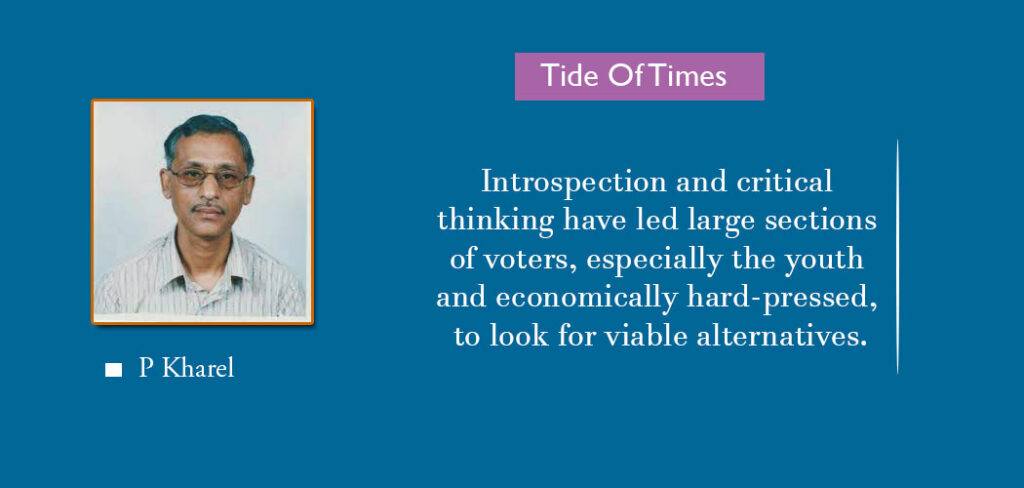Personalized politics and petulant attitude sharply shrunk the popularity meter of France’s President Emmanuel Macron as quickly as he rose to the seat of power in 2017. However, the first-round presidential election last week on April 10 left him almost high and dry in that Marine Le Pen gave him the shake-up neither he nor his close supporters had expected.
Macron’s reelection bid triggered nail-biting suspense until the last minute. British Prime Minister Boris Johnson might have savored a personal satisfaction of the French leader’s setback, though not all is lost yet, given the petty politics Macron,45, unrolled against the United Kingdom’s trade interests following Britain’s formal pullout from the European Union membership.
That is how voter verdicts build up. National Rally party leader Le Pen closed in on Macron’s margin of lead in the opinion polls day by day in the closing fortnight. Reality dawned on Macron as to how far he had lost large voter support because of his arrogant style.
He made noises about vainly trying to become a self-appointed peacemaker to the Ukraine crisis. Moscow did not trust him, as it concluded he would side with the US-led herd when the crunch came. Macron’s career at the summit of French power began when he was nearing 40 years in May 2017 and entered the 500-year-old Elysee Place which serves as the residence-cum-office for the country’s executive president. He had secured 66.1 percent of the votes in the second round but with support from candidates that lost the first round and did not want Le Pen to win.
Whereas France was seen as supporting some of its other European cousins that advocated identity politics at the micro-level far and wide, the same has begun to bug French politics now, much to the consternation of the country’s self-declared liberals. The May presidential elections have shown that the status quo in the existing equation in outlook is changing in France and elsewhere. The trend is likely to gain ground in the coming times, as growing dissatisfaction marks electoral politics.
Economic equality and disguised forms of discriminatory practices have made people fed up with the existing conditions. Derided by the political elite who bask in the status quo that turns the wheels of their profit-making machines and acknowledges their resultant station in society, the term populism is downplayed regarding its growing adherents and overplayed as a weapon of “destabilization”.
Le Pen’s surge in political stock has unnerved the hardliners among the status quoits. She has become a symbol of populism, as defined by her critics. The first round established her firm and solid as a force to reckon with rather than a temporary phenomenon destined to peter out in the not far future.
Reality speaks
Public opinion polls consistently give Russian President Vladimir Putin approval ratings of more than 70 percent — something most of his counterparts in Western democracies do not maintain even in their first few years in office. Russians, in general, see Putin as a man who restored law and order, stabilized the economy, and restored Russian pride as a force to reckon with.
In France, voter abstention plays a crucial role. Should supporters of the leftist group decide not to show up in the run-off slated for next Sunday, Le Pen’s prospects for the presidency will soar. Her father Jean-Marie Le Pen entered the second round in 2002 but rival parties combined to vote against him just as the daughter, too, faced a similar situation in 2017.
The recent voting trend shows that French youth do not feel as duty-bound to cast their ballot as the older generations have done after World War II. This gives the anti-Le Len sections the jitters. In previous instances, the left groups supported the leading candidate to prevent the far-right candidate from victory. In the recent first-round polls, Macron obtained a little less than 28 percent of the votes cast against Le Pen’s 23 percent-plus and the far-left Jean-Luc Melenchon’s 22 percent.
Now that he is out of the race, Melenchon has made an appeal to his supporters to vote for the incumbent president. Former President Nicolas Sarkozy, who was found involved in a “corruption pact” of bribery and influence peddling, has pledged to support Macron in exchange of a promise to have him appointed as the next prime minister. This all carries political baggage that could erode the credibility of parties engaged in traditional politics.
More to the right
Meantime, Hungary’s President Viktor Orban won a landslide majority of voters for the fourth consecutive time. The traditional European powers groaned under the weight of the outcome they deeply hated and moaned over such tendencies in other locations as well.
Introspection and critical thinking have led large sections of voters, especially the youth and economically hard-pressed, to look for viable alternatives. Having faced severe shortages and galloping inflation in the initial years after the 1991 disintegration of the Soviet Union, the Russian people underwent highly trying times. When Vladimir Putin became president in December 1999 to complete the remaining year of Yeltsin’s term, he swung into the action of robust campaigning. He not only obtained a fresh full term in office on his own but has wielded power ever since. These are times, when new world order is emerging, whose early signs have started unfolding. Its course, shape, and outcome will determine social and national outlook, international and economic ties, and power equations. The traditionally privileged will dig their heels deep to keep their positions from sliding whereas the new forces will not let down their ambitions for a larger say and share in setting agendas.
(Professor Kharel specializes in political communication.)

MORE NEWS
Young leadership in choice, Saugat wins with respectable votes
Baglung flood: Three killed as flood sweeps away motorcycle and scooter
‘Youth in slogans many times, Youth in leadership this time’ – Saugat Thapa [Video]
Gandaki minister Deepak Manange resigns after ministry transfer